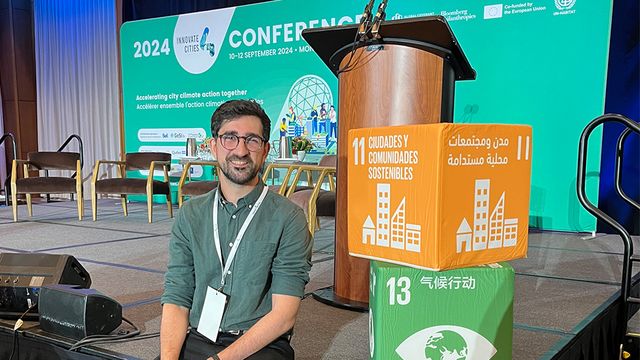A Transformative Gathering: Reflecting on the Innovate4Cities 2024 Conference
The 2024 Innovate4Cities (I4C24) Conference held in Montreal from September 10-12 marked a pivotal moment in the global effort to accelerate urban climate action. Co-hosted by the Global Covenant of Mayors for Climate & Energy (GCoM) and UN-Habitat, this three-day event brought together more than 2,000 participants from over 100 countries, including policymakers, scientists, civil society leaders, and urban experts, both in person and online.
A Global Call to Action
Centered around the urgent need for cities to spearhead climate action, I4C24 fostered a shared commitment to bridging the gap between local ambition and global climate goals. The culmination of these efforts came in the form of the Montréal Call to Action on Cities, Climate Research, and Governance, a declaration advocating for stronger collaboration between national and subnational governments. This call to action reflects the need for enhanced multilevel governance and partnerships to ensure that climate goals can be met not just in theory, but in practical and impactful ways.
The conference highlighted the key findings of the 2023 Global Stocktake, which revealed that the world is not on track to meet the targets of the Paris Agreement. With this in mind, I4C24 emphasized the critical role of urban science, innovation, and research in driving city-level climate solutions, positioning local governments as central actors in the global climate effort.
Bridging Global Ambition with Local Reality
One of the key takeaways from the event was the necessity of tailoring climate solutions to local contexts. As Montréal Mayor Valérie Plante noted in her opening remarks, “Finance must go hand in hand with sustainable development, and the latter cannot advance without finance.” This idea underpinned much of the conference’s dialogue, from discussions on mobilizing urban climate finance to enhancing cities' capacity to implement climate action plans. More than 200 sessions explored themes such as biodiversity, climate finance, resilience, and environmental justice, all through the lens of urban sustainability.
Notably, the conference showcased groundbreaking tools and initiatives designed to empower cities in their climate efforts. The launch of the Climate Innovation Readiness Navigator for Cities and Local Governments (CIRN) and new features for GCoM’s Data Portal for Cities provided cities with vital resources to track emissions and climate progress more effectively.
Transdisciplinary Collaboration and Inclusivity
One recurring theme at I4C24 was the importance of breaking down silos. Transdisciplinary collaboration—between scientists, urban planners, government leaders, and civil society—emerged as a vital component of the climate conversation. The Conflict Café organized by Percolab, where 200 participants brainstormed ways to improve collaboration across sectors, underscored the complexity and necessity of aligning diverse perspectives on issues like health, safety, and environmental justice.
"One Size Doesn't Fit All" — Localizing SDG Indicators
A key session chaired by the SDSN, titled "One Size Doesn’t Fit All," emphasized the need for localized and granular approaches to urban sustainability metrics. Guilherme Iablonovski, a geospatial data scientist at the SDG Transformation Center, presented SDSN’s pioneering work on enhancing the granularity of SDG indicators. Iablonovski highlighted that while global frameworks such as the Sustainable Development Goals (SDGs) provide a vital structure for assessing progress, cities often need more localized data to make informed decisions.
In his presentation, Iablonovski showcased urban geospatial indicators, which allow cities to assess their progress toward the SDGs in ways that reflect local realities, challenges, and capacities. These indicators are instrumental in ensuring that no one is left behind, especially in rapidly urbanizing regions. The session stressed that urban solutions must be context-specific, considering the unique socio-economic and environmental landscapes of different cities.
By utilizing geospatial data, cities can develop more tailored, actionable climate strategies that align with both local conditions and global goals. The approach showcased by SDSN ensures that cities have access to tools that not only measure climate progress but also drive tangible action at a localized level, a key element of the conference’s broader theme of bridging ambition with action.
Looking Forward: A Resilient Future
I4C24 was not just a gathering of minds but a launchpad for future action. The conference’s insights will contribute to the upcoming IPCC Special Report on Climate Change and Cities, as well as inform the discussions at the World Urban Forum (WUF12) in Cairo this November. With announcements like the return of the Innovate4Cities Conference in 2026, the momentum from Montreal is set to continue, driving forward the research, policies, and partnerships needed to build climate-resilient cities worldwide.
The success of I4C24 proves that when cities come together, equipped with the latest research, innovation, and collaborative spirit, the path to a sustainable, net-zero future becomes clearer and more achievable.
The journey toward climate-resilient cities is just beginning, and the time for transformative action is now.
For more details, read the Montréal Call to Action.
